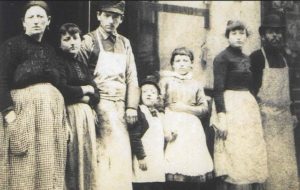Irish people have been immigrating to America since the colonial period (Hershkowitz 11). However, most of these immigrants were Protestant, from the Northern parts of Ireland and were primarily wealthier merchant individuals (Hershkowitz 11: Moss 126). Because of this, these Irish immigrants had no problem assimilating into the greater American society (Moss 126).
During the early 1820s through the early 1830s, there was an increase in Irish immigration and it continued to increase throughout the 1830s and 1840s because of the Irish Potato Famine (Anbinder 117, 125). These Irish immigrants were primarily from the South and West of Ireland and were Catholic causing Irish Catholics to outnumber Irish Protestants in America (Anbinder 125). Due to their Catholicism and their lower class, these Irish immigrants were unable to assimilate as the previous ones had, and thus were subjected to discrimination, since they were viewed negatively by American society.
The discrimination was why it became necessary for people to attempt to create a cohesive Irish-American identity through the formation of gangs and cultural events like the St. Patrick’s Day Parade.
Works Cited
Anbinder, Tyler. City of Dreams: The 400-Year Epic History of Immigrant New York. Boston: Mariner Books Houghton Mifflin Harcourt, 2017.
Hershowitz, Leo. “Overview: The Irish and the Emerging City: Settling to 1844.” In The New York Irish. Edited by Ronald H. Bayor and Timothy J. Meagher. Baltimore: The Johns Hopkins University Press, 1996: 11-34.
Moss, Kenneth. “St. Patrick’s Day Celebrations and the Formation of Irish-American Identity, 1845-1875.” Journal of Social History 29, no. 1 (Autumn 1995): 125-148.
Picture Source
Laird, Rachel. “Irish Immigrants Lives Laid Out at New York Tenement Museum.” IrishCentral. Last updated June 25, 2018. https://www.irishcentral.com/roots/history/irish-immigrants-new-york-tenement-museum

